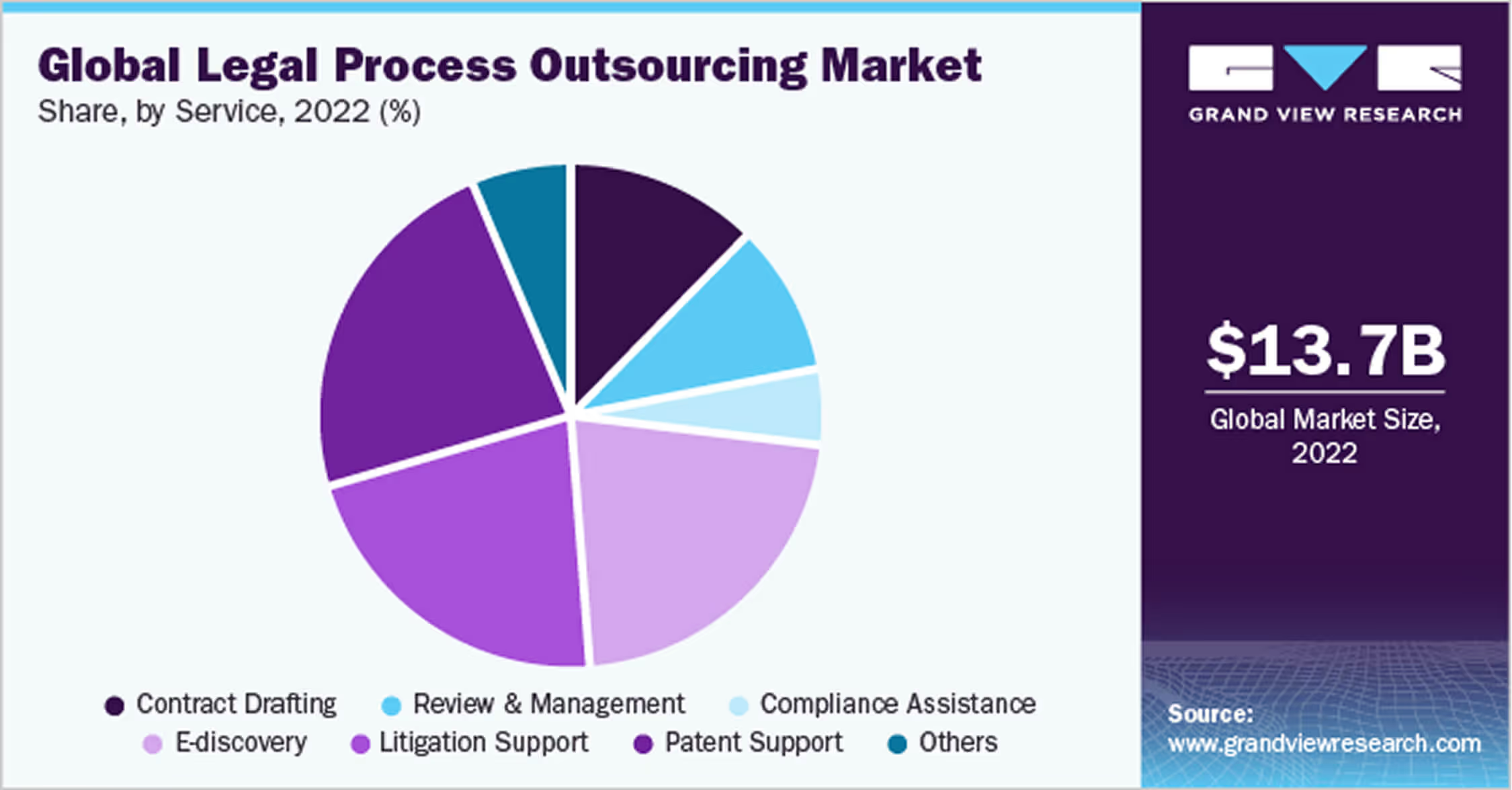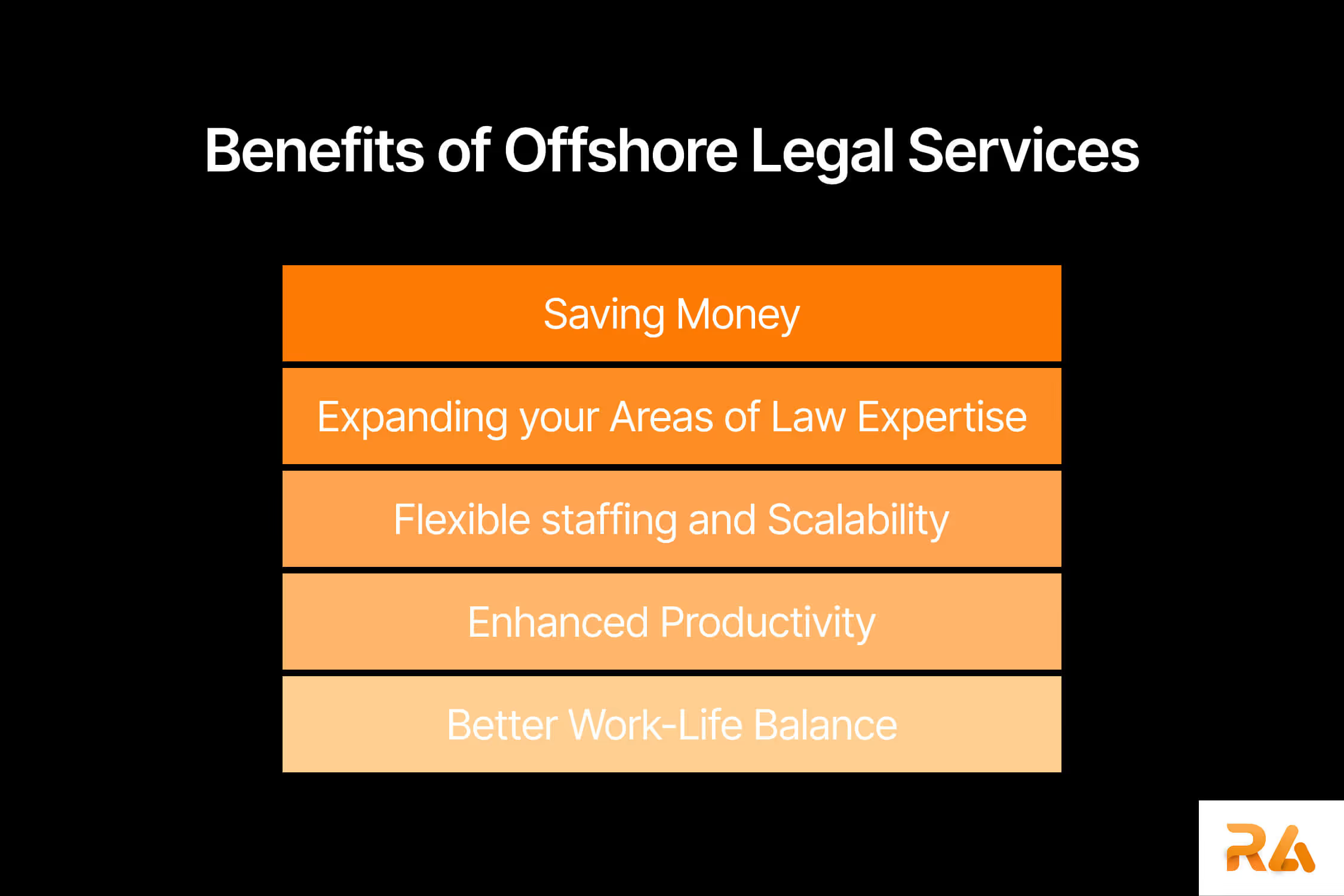Legal work has always been demanding, but it used to be more straightforward. You’d hire attorneys, train them, and keep them busy with steady client work. But many firms fail to realize that even with consistent workload, their business remains stagnant and shows little growth.
One of the main reasons is the lack of a scalable strategy. In fact, reports show that lawyers at small to medium-sized law firms work an average of 42 to 54 hours per week, which is more than the 38-hour average for full-time employees in other industries.
However, there’s been a massive shift in how law firms operate. Many are now discovering the advantages of offshoring. The global legal process outsourcing market was valued at USD 13.67 billion in 2022 and is expected to grow at a compound annual growth rate (CAGR) of 31.4% from 2023 to 2030. Even more compelling, the market is projected to reach USD 117.89 billion by 2030.

This growth shows how legal outsourcing is being leveraged by everyone, from solo practitioners to AmLaw 100 firms, to deliver better outcomes for clients. In this guide, we’ll walk you through what offshore legal services can offer your practice and how to maximize the benefits of this approach.
What is Offshore Legal Services for Law Firms?
Offshore legal services for law firms refer to the hiring of legal professionals from other countries to delegate specific tasks or processes. Instead of expanding your team locally, you find talent from regions with lower labor costs but comparable legal expertise.
These talents aren't just overseas assistants. You're working with licensed and experienced professionals who understand U.S. legal systems and can produce the same quality work you'd expect from domestic staff.
Legal Process Outsourcing vs. Offshoring: What is the difference?
The terms “outsourcing” and “offshoring” are often used interchangeably, but they have distinct meanings. Understanding the distinction can help you navigate legal operations more effectively. Here’s a simple definition of each:
Legal Process Outsourcing (LPO) is a broad term that refers to the delegation of legal tasks to external providers, which can be located locally, nearshore, or offshore.
Offshoring specifically refers to relocating legal services to professionals based in other countries.
Benefits and Risks of Offshore Legal Services
Every strategic decision involves trade-offs, and offshore legal services are no exception. Let’s start by navigating its advantages:

Here are the Benefits:
Saving Money
Let’s start with the most immediate benefit: financial savings. Compared to the U.S., many other countries have a lower cost of living and lower wage standards. Law firms that outsource legal work offshore can cut labor costs by more than half, while still providing their remote teams with a decent, livable wage. This enables firms to hire qualified legal professionals at a significantly reduced cost, freeing up more resources for business growth and reinvestment.
Expanding your Areas of Law Expertise
Many offshore providers employ attorneys with specialization in specific practice areas. Instead of trying to be an expert in every legal field internally, you can outsource to professionals with advanced degrees and experience in areas like intellectual property, personal injury, and more.
Flexible staffing and Scalability on Demand
Traditional staffing models require long-term commitments and come with substantial overhead. Offshoring gives you the ability to hire legal talent on a project or contract basis, at any skill level and for any type of case. You can scale your team up or down as needed, enabling you to handle changing caseloads without the risk of underutilized full-time staff. It’s also a smart way to trial talent before considering a full-time hiring.
Enhanced Productivity Through Time Zones
Time zone differences can become a strategic asset. When working with teams in countries like the Philippines or Latin America, your remote staff can continue progress on projects while your in-house team is offline. This effectively extends your productive hours and shortens turnaround times for client deliverables.
Better Work-Life Balance
Research shows that 52% of in-house and private practice lawyers experience burnout due to overwhelming workloads and long hours. One major contributor is the constant pressure to maximize billable time at the expense of personal well-being. Offshoring can alleviate that burden by allowing you to delegate time-consuming but essential tasks. By delegating tasks, you can reduce your workload, reclaim personal time, and create a more sustainable work-life balance.
Here are the Risks:
Communication Barriers
Different communication styles and cultural nuances can create coordination challenges that require careful management. What seems like a simple instruction might be interpreted differently, leading to work that doesn't meet your expectations.
Best Practice: Establish clear communication protocols from day one. Use project management tools like Asana or Trello, and set expectations for turnaround times and check-ins.
Data Security Concerns
Client confidentiality is critical in legal work. Offshoring may raise concerns about the safety of sensitive data, especially given the differences in privacy laws and enforcement across countries. However, most providers understand this risk and invest heavily in secure digital infrastructure with advanced encryption and cybersecurity measures.
Best Practice: Work only with providers that have strong security protocols and clearly defined data-handling procedures in your contract.
Quality Control Challenges
Inconsistent output can be a risk, especially if your offshore provider manages multiple clients or your instructions lack specificity. Without regular oversight, the final deliverables may fall short of your firm's standards.
Best Practice: Set up a quality assurance process, provide ongoing feedback, and maintain open communication. Another effective option is partnering with a provider like Remote Attorneys, which includes in-house support to manage your offshore legal team and ensure high performance.
Types of Offshore Legal Services
Most law firms start with a few core services and expand based on what works best for their practice. These are the most commonly outsourced legal tasks performed by professionals who follow U.S. legal standards and procedures.
E-Discovery
E-Discovery services, short for Electronic Discovery, refer to the process of identifying, collecting, and processing electronically stored information (ESI) for use in litigation or investigation. When you offshore this task, legal professionals manage large volumes of digital evidence from initial data processing to final privilege review.
Document Review
This is one of the most heavily outsourced legal functions. By delegating this process, you gain access to teams that can review thousands of documents to identify key terms, potential issues, and compliance concerns. These teams are trained to follow U.S. legal standards and often work under the guidance of in-house counsel to ensure accuracy.
Legal Research and Writing
This service involves analyzing case law, statutes, and regulations to support litigation strategies, motions, and legal opinions. Offshore attorneys, often trained in common law jurisdictions, are skilled in using legal databases such as Westlaw and LexisNexis. They can prepare legal memoranda, draft legal arguments, and even assist in writing briefs.

Contract Drafting
Offshore legal teams can assist with drafting standard agreements such as NDAs, service contracts, employment agreements, and vendor contracts. These professionals are adept at following your firm’s guidelines, using established templates and meeting specific client requirements.
Compliance and Regulatory Support
This involves helping firms and clients adhere to industry standards and government regulations. Your remote team can continuously monitor regulatory changes in your practice areas, prepare detailed compliance reports, maintain corporate governance documentation, and handle routine regulatory filings. Their assistance is especially valuable in sectors like healthcare, finance, and data privacy, where the regulatory landscape is constantly changing.
Building a Successful Law Firm through Offshoring
With the U.S. market expected to grow at a CAGR of 31.4% over the next five years, offshoring is becoming an increasingly popular option for law firms. Many are finding value in working with experienced providers who offer more than just cost savings and demonstrate true commitment.
The best offshore relationships are built on trust and shared goals. They can grow into strong partnerships with providers who become deeply familiar with your firm and align closely with how you work.
Offshoring isn’t a one-size-fits-all solution. And remember, the cheapest option is rarely the best value. It’s important to evaluate whether this approach supports both your current operations and long-term goals. Look for providers who see themselves as extensions of your team, not just vendors.
Consider a provider like Remote Attorneys, trusted by thousands of law firms. If you’re curious whether it could work for you, we offer a complimentary consultation to help assess your needs with our legal team.




.webp)
.webp)